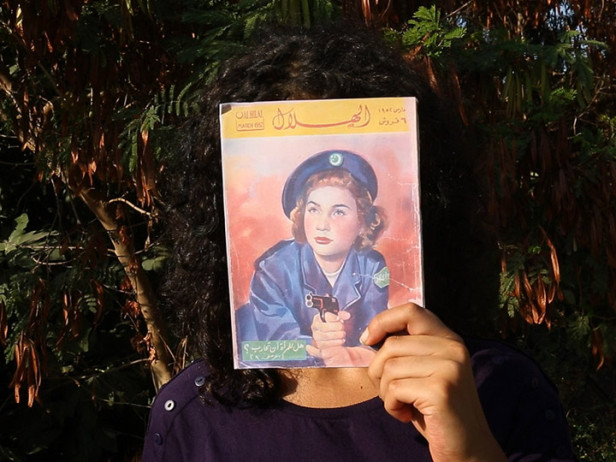A video performance (2012-2013) that uses the history of a magazine (Cairo’s Al-Hilal 50s and 60s collection) as the starting point for an inquiry into Jamila Bouhired, the Algerian freedom fighter. From the different representations of Jamila in Cinema to her assimilation and promotion through the magazine, the performance attempts to look at the history of socialist projects (Egypt), anti-colonial wars (Algeria), and the way they have promoted and marginalised feminist projects. Naomie Pieter performs AFRODisiac.
MARWA ARSANIOS
Marwa Arsanios (b. 1978, USA, lives and works in Beirut, Lebanon) received her MFA from University of the Arts London in 2007, and was a researcher at the Fine Art department at Jan Van Eyck Academie from 2011 to 2012. She has had solo exhibitions at Witte de With, Rotterdam, the Netherlands (2016), Kunsthalle Lissabon, Lisbon (2015), and Art in General, New York (2015). Her work was also shown at the 55th Venice Biennale (2013), the 12th Istanbul Biennial (2011), Home Works Forum in Beirut (2010, 2013, 2015), the New Museum, New York (2014), M HKA, Antwerp, Belgium (2013), and nGbK, Berlin (2012). Screenings of her videos have taken place at the Berlinale, Berlin (2010, 2015), e-flux storefront, New York (2009), and Centre Pompidou, Paris (2011). In 2012 Arsanios was awarded the special prize of the Pinchuk Future Generation Art Prize.
NAOMIE PIETER
Naomie Pieter is currently studying at the SNDO – School for New Dance Development in Amsterdam and describes herself as a black artivist. She has created several performances such as AFRODisiac in which she connects history with the present. In her work, she aims to disrupt spectatorship and to unearth the unequal between, black and white. Guided by her ancestors she evokes their spiritual energy to unite them with the audience as they chant for a better future.
This work is screened as part of the side programme around Guess Who’s Coming to Dinner Too?, an installation by artist and activist Patricia Kaersenhout and concerned with overlooked histories of Black women.

